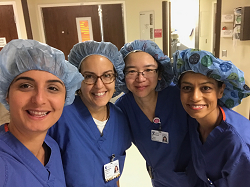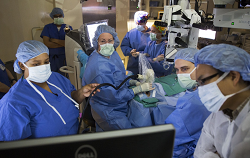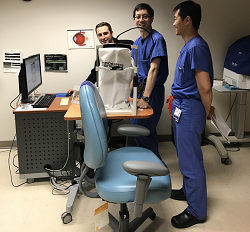
Duke is a tertiary referral center for complex surgical pathology and Duke VR fellows will be well-versed in the management of proliferative vitreoretinopathy, recurrent retinal detachments, refractory macular holes, pediatric retinal detachments, myopic traction maculopathies, combined cases with other ophthalmology subspecialty services, as well as many other unusual and challenging situations.

Clinical training includes participating in clinics and surgery using advanced imaging techniques and the latest surgical instruments and equipment with Duke VR Surgical Faculty; Durga Borkar, MD, Xi Chen, MD, Jason Fan, MD, Sharon Fekrat, MD FACS, Dilraj Grewal, MD, Glenn Jaffe, MD, Yannek Leiderman, MD, PhD, Arpita Maniar, MD, Miguel Materin, MD, Cynthia Toth, MD and Lejla Vajzovic, MD. A highly accomplished and experienced ocular echographer is on site as well.

Each two-month rotation has about 2 days/week in the OR, 2 days/week of clinic, and one research day. Surgical experience is evenly spread across both the 1st and 2nd years of the fellowship. The clinical and surgical experience is comprehensive with immersion in all subspecialty areas including ocular oncology, pediatric retina, and uveitis.
Unique surgical techniques, such as chandelier buckles, mixed-gauge vitrectomy, subretinal displacement of subretinal hemorrhage, various secondary IOL fixation techniques, Retisert implantation, gene therapy, and autologous retinal transplants, are part of the experience.
Surgical technology includes: various gauge surgery (from 20- to 27- guage) Constellation, StellarisPC, and Eva vitrectomy machines, contact and non-contact wide field viewing systems including A.V.I., BIOM and ReSight, intraoperative optical coherence tomography systems (including a commercial hand-held system and our own investigational real-time microscope-integrated imaging system), chandelier options for bimanual surgery, encircling and radial scleral buckling techniques, commercial and investigational drug delivery implants, radioactive plaque management, endoscopic surgery, NGenuity, and multimodal intraoperative imaging (including ultrasound, Retcam imaging, SD OCT and FA). Surgical videotaping is streamlined and fellows are encouraged to present surgical videos at our internal surgical conferences as well as national and international meetings.

The 2nd year surgical fellows each rotate at the Durham VA Health System, located adjacent to the Duke Eye Center. This includes one full OR day and one half-day VR surgical clinic. At the VA, fellows develop increasing autonomy as they participate in vitreoretinal surgery and resident education, mentored by Dr. Fekrat. Surgical videotaping is streamlined.
Fellows receive both informal and formal periodic feedback from faculty regarding their progress in training.